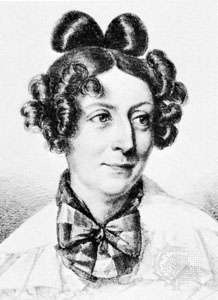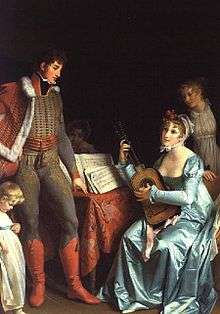Laure Junot, Duchess of Abrantès
Laure Junot, Duchess of Abrantès (née Martin de Permond; 6 November 1784 – 7 June 1838) was a French writer. She was the spouse of French general Jean-Andoche Junot.
| Laure Junot, Duchess of Abrantès | |
|---|---|
 | |
| Born | 6 November 1784 Montpellier |
| Died | 7 June 1838 Paris |
| Occupation | Memoirist |
| Spouse(s) | Jean-Andoche Junot |
| Signature | |

Biography
Laure was born at Montpellier, the daughter of Charles Martin de Permond and his wife Panoria, to whom during her widowhood the young Napoleon Bonaparte made an offer of marriage. Her mother, Panoria, was descended from the Comnene family, the last Greek dynasty from the Empire of Trebizond.[1][2] The Martin de Permond family, after various vicissitudes, settled at Paris, and Bonaparte certainly frequented their house a good deal after the downfall of the Jacobin party in Thermidor 1794.[3]
In 1800, Laure married Jean-Andoche Junot (created Duke of Abrantès, whom she called Alexandre, in 1806). This was early in the Consulate and she at once entered eagerly into all the gaieties of Paris, and became noted for her beauty, her caustic wit, and her extravagance. The First Consul nicknamed her petite peste, but treated her and Junot with the utmost generosity, a fact which did not restrain her sarcasms and slanders in her portrayal of him in her Memoirs. During Junot's diplomatic mission to Lisbon, his wife so displayed her prodigality, that on his return to Paris in 1806 he was burdened with debts, which his own intrigues did not lessen. She joined him again at Lisbon after he had entered that city as conqueror at the close of 1807; but even the presents and spoils won at Lisbon did not satisfy her demands; she accompanied Junot through part of the Peninsular War.[3]
On her return to France she displeased the emperor by her vivacious remarks and by receiving guests whom he disliked. The mental malady of Junot thereafter threatened her with ruin; this perhaps explains why she took some part in the intrigues for bringing back the Bourbons in 1814. She did not side with Napoleon during the Hundred Days. After 1815 she spent most of her time at Rome amidst artistic society, which she enlivened with her sprightly converse; a monarchist on her return to Paris during the Restoration, she compiled her spirited but somewhat spiteful Memoirs with the encouragement and supervision of Balzac, her lover since 1828.[3]
Ridiculed by Gautier as the "Duchess of Abracadantès" and fallen into poverty, she died in a nursing home in Paris in 1838.
Works
The Memoirs were published at Paris in 1831–1834 in 18 volumes. Many editions have since appeared.[3]
Of her other books the most noteworthy are Histoires contemporaines (2 vols., 1835); Scènes de la vie espagnole (2 vols., 1836); Histoire des salons de Paris (6 vols., 1837–1838); Souvenirs d'une ambassade et d'un séjour en Espagne et en Portugal, de 1808 à 1811 (2 vols., 1837).[3]
Notes
- Ouvrard, Robert "Consulate First Empire - Permon Laure, Duchess of Abrantes" Histoire-Empire.org. (French, tr. English)
- "Duchesse d'Abrantes". AEI.ca. (French, tr. English).
- Rose 1911, p. 561.
References

Further reading
- Alice Acland. The Corsican Ladies (novel). London: Peter Davies Ltd. 1974. ISBN 9780432004104
External links
- Works by Laure Junot, Duchess of Abrantès at Project Gutenberg
- Works by or about Laure Junot at Internet Archive
- Junot, Laure, duchess d'Abrantès (1832). Memoirs of the Duchess d'Abrantès (Madame Junot). New York: J.& J. Harper.